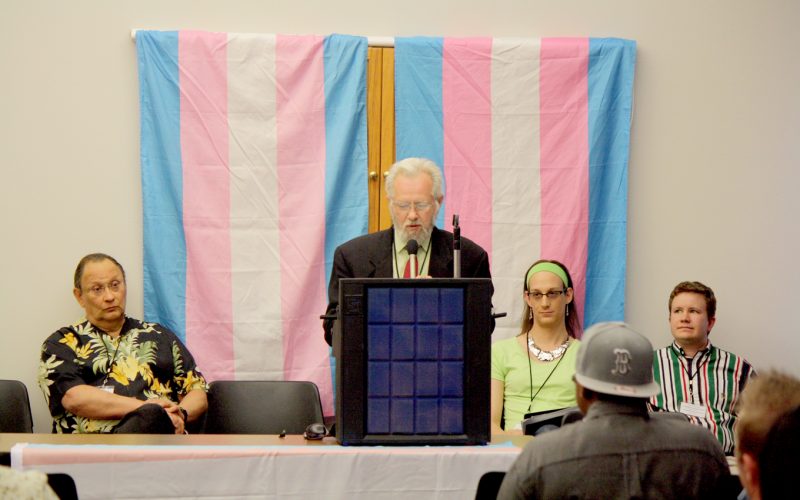
Staff Photo Nick Brothers
Garin Wiggens, a transitioned man, speaks about his experiences of counseling with transgender people at the NWA Center for Equality.
Various interest and support groups throughout Northwest Arkansas gathered Tuesday at the University of Arkansas to advocate for transgender visibility.
Hosted and led by members of the Transgender Equality Network, the intention of the event was to provide an opportunity for members of the transgender community and medical professionals to network and build a stronger relationship. The event was also meant to be educational, said Justine Turnage, co-founder of Transgender Equality Network — who emceed the event.
“It was a spectacular event,” said Turnage, who identifies as a transgender woman. “For a transgender-centric event, it’s heartwarming to be able to speak to a full room with such a diverse crowd. There was a lot of valuable info shared. We still have more work to do. It’s all about the steps though, we have to do it again and each time we’ll grow.”
The first International Transgender Visibility Day started in Michigan by Rachel Crandall in 2009 as a reaction to the lack of LGBT holidays celebrating transgender people.
Seeking proper specific medical attention is a common issue for transgender people. In Arkansas, no insurance covers trans health expenses, and neither does Medicaid. Oftentimes they have to try out multiple doctors and “hope for the best,” Turnage said.
Craig Dinger, a physician in Eureka Springs, is the only doctor — along with his partner John House — Turnage has found in the area with the knowledge to provide the medical care she needs. Dinger spoke at the event about medical needs and realities of transgender people.
Most male to female sex change surgeries can cost upwards of $100,000 in the U.S., and many hormonal therapy treatments can be costly. Transgendered people are four more times at risk of contracting HIV than the national average. Additionally, trans women of color were 49 times more likely to contract HIV than their cisgendered counterparts, according to a Lancet study published in 2013.
Out of the estimated 27.7 percent of individuals with HIV, only 11 percent self-report they have the disease, said Wade Cunningham of NWA HOPE. NWA HOPE offers free HIV/AIDS testing on Tuesdays and Thursdays and can be contacted at 1-888-391-9222 or by email, nwahope@nwaequality.org to set up appointments.
Along with discussing the medical issues transgender people face, two speakers discussed the importance of spirituality in transitioning.
“There’s the popular misconception that we are non-religious,” said Lisa Stuart, a transgender female. “Those are lies perpetuated by people who don’t understand unconditional love…If it wasn’t for my faith I wouldn’t have the courage to stand here today as who I am.”
The groups included NWA Center for Equality, Students for Gender Equality, OMNI Center, HRC Arkansas, PFLAG, P.R.I.D.E., Hands Up NWA, NWA Hope, ArTEC. Fayetteville Mayor Lioneld Jordan was even in attendance briefly.
“Whenever (Transgender Equality Network) reached out to us to help them find a venue, we said ‘Definitely,’” said Jodi Nimmo, founder of the UofA Students for Gender Equality. “I’m really impressed with the level of work they put into the event. I really appreciate the fact they brought counselors and providers in, not just for our listening benefit but for the people who came. I think it’s a really big asset for the community to have this networking opportunity.”
Turnage estimates that there are more than 50 transgender individuals in the northwest Arkansas area. In addition to providing an annual visibility meeting, Transgender Equality Network plans on doing more educational programs and involving more lawyers, doctors, clergy and business owners in the events to come.
“Visibility is our gateway to understanding,” said Katelyn Bartow, a transgender woman, during the closing remarks. “The transgender population of Northwest Arkansas faces rejection within all aspects of life. They witness rejection by family and friends, denial to public accommodations, unemployment and eviction. Many are refused access to basic health care services.
“Visibility turns fears into friendships. As a community, we can accelerate this process by telling our stories and being unified in our message, participating in public events, building coalitions, being positive role models and redefining stereotypes.”



